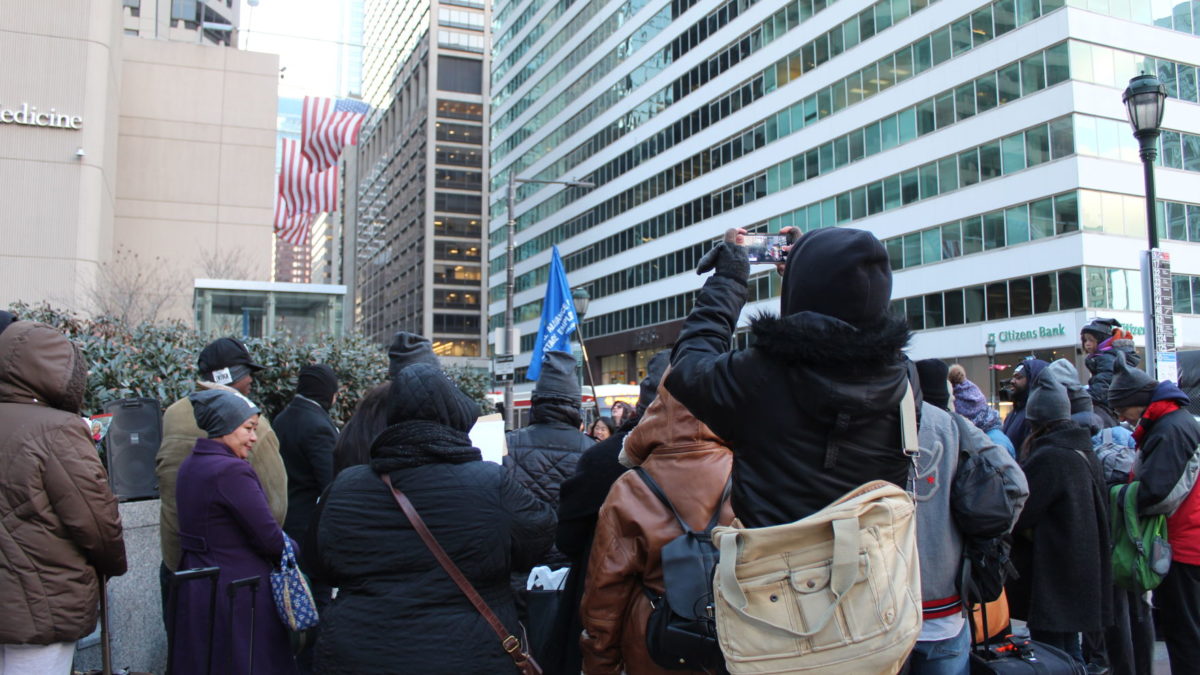Hotel workers, City Council members and candidates, and clergy members rallied on March 6 against the $42 million in subsidies received by J.W. Marriott International’s W Element Hotel.
Gathered outside the Philadelphia Industrial Development Corporation (PIDC) office at 15th and Market Sts., protesters demanded that W Element Hotel return the taxpayer money for failing to meet its contractual obligations. The luxury hotel was set to open by February 2019. Still under construction at 15th and Chestnut Sts, the hotel announced it would delay its completion until early 2020.
Out of W Element Hotel’s $42 million subsidies, $25 million comes from a state Redevelopment Assistance Capital Program (RACP) grant. The other $17 million is part of a US Housing and Urban Dev Department (HUD) 108 loan, which is allocated from the city’s federal funds for affordable housing. Both sources include clauses in their contracts that state deadlines must be met in order to secure the funding.
Organized by Unite Here Local 274, a labor union which represents 4,000 private sector hotel and food service workers, demonstrators brought suitcases to represent their inability to stay at the unfinished hotel.
“One of the more serious issues is that the City money came out of HUD. Housing and affordable housing, in particular, is an essential need in our city,” City Councilwoman Helen Gym, a speaker at the rally, told Philadelphia Weekly. “I want to make sure that if this hotel does not live up to its promises, we’ve got a lot of good public service projects that can use those funds.”
When asked how the situation with W Element may be comparable to the Four Seasons Hotel Philadelphia, set to open this summer at the Comcast Technology Center, Gym responded ambivalently with the positives and negatives of financial incentives to promote city infrastructure.
“As a member of city government [I’m] taking a hard look at the subsidies that we’re giving out and what we’re getting in return,” Gym explained. “It’s important to understand that subsidies are one of the most important municipal tools that we’ve got to spur economic development and growth in the city, but it’s got to be used in the right way and those entities that receive it have to live up to the promises that they’ve made to us. If they don’t, we have the right to get that money back.”
Erika Almirón, an at-large candidate for City Council, said this issue goes beyond breaking contracts and points to the unethical nature of these types of subsidies.
“Why don’t we think about funding the things that we actually need in this city,” said Almirón. “[This is] disappointing and it’s actually embarrassing.”
A child of immigrant workers, Almirón further explained that it should go without saying, workers’ rights, education and affordable housing should take precedence over luxury hotels.
David Hawkins, a board member of Unite Here Philly and an employee at the Sheraton Hotel, believes that W Element Hotel’s large-sum subsidy highlights the disparity between the economic capital of luxury hotels and the industry’s general working conditions. He counts his blessings that he has had a labor union for 35 or so years to protect his rights. But it is a safety net that is not afforded to all in the hospitality industry.
“I have a nice home, I got some money put away for retirement, and I’m getting a pension. That’s what [a labor union has] provided for me, and I see other people around here who don’t have union jobs,” explained Hawkins “They are getting slave wages, they have got to work two or three jobs. They die early in life because they’re working so hard. That’s not right.”
TWITTER: @ANDREAJCANTOR




